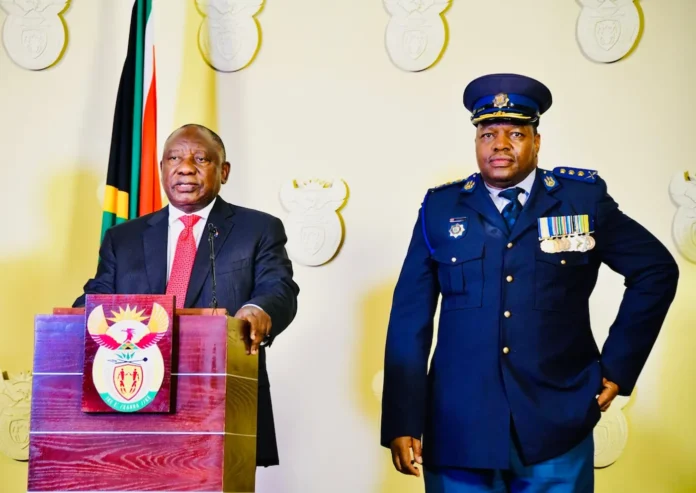Police Commissioner Alleges Minister Tried to Shut Down Political Killings Task Team Despite Successes
National Commissioner of Police, General Fannie Masemola, has revealed that Police Minister Senzo Mchunu, currently on special leave, told him that President Cyril Ramaphosa was in agreement with the immediate disbandment of the KwaZulu-Natal SAPS Political Killings Task Team (PKTT).
Masemola testified on Tuesday during the fifth day of the Judicial Commission of Inquiry into criminality, political interference, and corruption, held at the Brigitte Mabandla Justice College in Pretoria. The commission is chaired by retired Constitutional Court Justice Mbuyiseli Madlanga.
According to Masemola, Mchunu conveyed the president’s alleged agreement during a meeting on 27 March 2025, which was called to discuss the PKTT’s work. The meeting included Deputy Ministers of Police Cassel Mathale and Polly Boshielo, Deputy National Police Commissioner for Crime Detection Lt-Gen Shadrack Sibiya, National Head of Crime Intelligence Lt-Gen Dumisani Khumalo, and other senior police officials. Khumalo serves as the project leader of the PKTT.
Masemola said Mchunu became “visibly angry” when the discussion turned to the PKTT’s growing caseload.
“When we got to the agenda item of the PKTT, the minister [Mchunu] became visibly angry. In our previous meeting on 6 March 2025, there was a proposed plan that the PKTT would not be taking any new cases. There was an increase in the work of the PKTT and its cases increased. The minister picked it up and became angry,” Masemola told the commission.
The increased workload was due to the PKTT investigating the murder of an ANC ward councillor in KwaZulu-Natal, who was shot and killed on 4 February 2025. The task team arrested suspects linked to the killing.
“I found the minister’s reaction quite strange. It was the first time in my career to see a police minister angry that police have done a good job. That they have arrested someone linked to the killing of the councillor,” Masemola said.
Masemola described Mchunu’s behaviour as “boggling,” questioning why a minister would be upset by successful police operations. “The fact is you have police who have linked suspects to the councillor’s murder. You don’t appreciate that. You are angry that they [PKTT] exist and have been successful. Why do we have police? Are we not having police to fight crime…,” he said.
According to Masemola, the meeting ended abruptly after Mchunu refused to engage with Khumalo and the task team members directly. “He said he will only speak to me only. The minister said he did not understand why we are so adamant that the PKTT should not be disbanded. The minister said the president [Cyril Ramaphosa] is in agreement that the PKTT be disbanded. I was taken aback with that statement. Because in the last briefing with the president on the PKTT he was satisfied with its performance,” Masemola added.
Masemola also disclosed that the PKTT’s work was under scrutiny not just for political killings but also for its role in high-profile investigations, including the alleged kidnapping of businessman Jerry Boshoga in November 2024.
“The concerned party said that General Sibiya cannot investigate Boshoga’s kidnapping because he is a close friend of Matlala and they work together. The concerned person said Matlala is one of my deputies due to his closeness with Sibiya. And I am just not aware of it,” Masemola said, referring to tenderpreneur Vusimuzi “Cat” Matlala.
Masemola tasked Lt-Gen Dumisani Khumalo with investigating Boshoga’s kidnapping. Following their inquiries, Matlala became a person of interest. On 6 December 2024, Gauteng organised crime unit members conducted a search and seizure at Matlala’s house, although Boshoga was not found.
He added that on 16 January 2025, he and Khumalo informed Mchunu that Sibiya was allegedly involved with criminal syndicates. Masemola is yet to clarify whether these associations are based on verified evidence or allegations.
The testimony has highlighted tensions between operational independence and political oversight within the SAPS. Masemola’s account suggests that while the PKTT was effectively investigating politically sensitive murders, ministerial interference threatened to undermine its mandate.

Follow Us on Twitter











